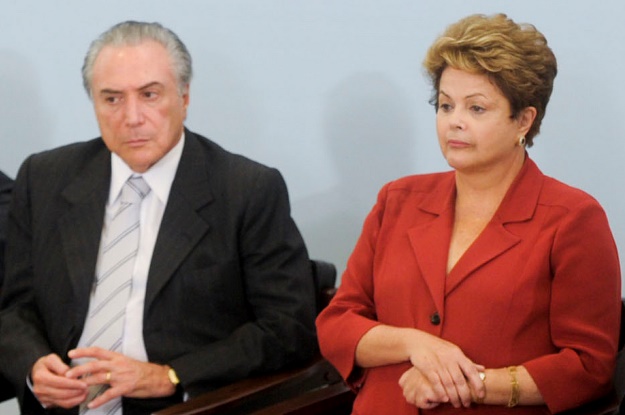Proceedings to oust Brazil’s President Dilma Rousseff have been underway for a week, and the battle lines are becoming clear. Rousseff appears to have enough support among the 28 parties in Congress to block impeachment over her alleged misuse of public funds. But that could change. Rousseff’s fate will ultimately rest in the hands of several small and relatively new parties, all of which have their own political futures to consider.
“They just move according to the money,” says Gabriel Petrus, a political consultant at Brasília-based Barral M Jorge & Associates, who formerly served as an adviser to Rousseff’s previous chief of staff. “The government is working to convince their leaders that they would still have benefits.”
On Tuesday night, deputies voted in a secret ballot to determine who will make up the 65-person special committee that will evaluate whether President Rousseff is guilty of wrongdoing. While the 272 deputies favoring a committee stacked with pro-impeachment voices outflanked the 199 deputies who voted pro-Rousseff, the vote underscored the fact that the president retains enough support to stay in office, for now.
Brazil’s Supreme Court has suspended impeachment proceedings while it reviews the legality of the vote. But if the committee is allowed to move forward and determines that Rousseff has committed an offense, a motion to impeach would be put to the lower house of Congress. Impeachment would require approval from two-thirds of the chamber’s 513 deputies in order to be passed on to the Senate, meaning Rousseff would need the support of just 172 deputies to end the discussion. Based on voting records, Estado de S. Paulo has estimated pro-government support at 212 deputies.
But those votes are not set in stone. If Rousseff loses the support she needs to stave off impeachment, it will be due to a loss of confidence from current coalition partners in the Brazilian Republican Party (PRB), Party of the Republic (PR), the Republican Party of the Social Order (PROS) and the Social Democratic Party (PSD), according to Petrus.
All four parties were formed over the past decade, in part out of defections from the opposition, amid promises of representation in the ruling Workers’ Party (PT) government. But with Rousseff’s future now on the rocks and her ability to hand out political patronage constrained by austerity measures, the 95 deputies from these four parties are considered up for grabs.
“These switchers were in search of more ‘goodies’ to be handed out by the Dilma government – but especially in 2015 they have been very disappointed by the few crumbs they received,” David Fleischer, a political expert and emeritus professor at the University of Brasília, tells AQ. Influential party members include the PRB’s Vinicius Carvalho (São Paulo), PR’s Aelton Freitas (Minas Gerais), and PSD’s Rogério Rosso (Federal District), with the last already warning that his party’s support is not guaranteed.
What might these deputies want in exchange for tilting the scales to the pro-impeachment camp? The same perks that attracted them to the ruling coalition, says Petrus: ministerial posts and budgetary influence. The question is whether the opposition can entice them with promises of future influence in the event of a government turnover, or if Rousseff herself can maintain their allegiance with promises of largesse to those who help her stay in office and ride out the economic and political storm, according to Petrus.
“The deputies are not only influenced by promises of money and budgetary power but (also) by what public opinion thinks,” adds Petrus, citing outside factors such as any escalation in anti-government street protests or pressure from special interest business and religious groups.
But as long as those four swing parties remain loyal (for the most part), the president looks comfortable. According to one estimate circulating among government officials in Brasília, the president has 145 solid anti-impeachment votes plus another 42 less firm votes – giving her an extra 15 votes to block impeachment. The opposition has 140 solid votes, plus another 40 leaning in that direction – putting them at 162 votes short. That leaves some 146 undefined votes, many from the fractious Brazilian Democratic Movement Party (PMDB) of Vice President Michel Temer, the largest party in the lower house.
Temer himself will have influence over swing voters from his own party and others in the government coalition. While he has not taken a public position on impeachment, he dropped a bombshell on Monday with a letter listing grievances with his boss – a harsh rebuke to Rousseff after she said she expected his “full confidence.” Insiders say Temer is positioning himself as a market-friendly successor to Rousseff who could revive economic growth and unify Congress.
For Rousseff, at this point the best-case scenario is that the entire impeachment process never comes to a vote, which isn’t out of the question. Thirty legal experts on Monday denounced the impeachment proceedings as unconstitutional and Rousseff’s team continues to challenge the process.
“The government didn’t want to play this game,” says Petrus. “But now that the game has begun, they’re playing it.”
Or as PT deputy Sibá Machado has said: “This is war and we are going to fight it out.”






